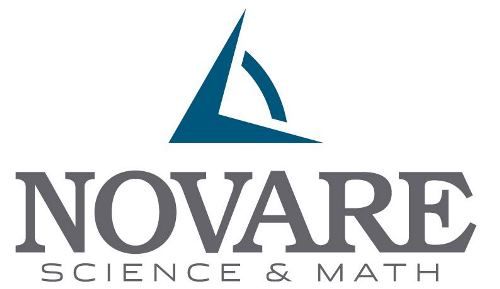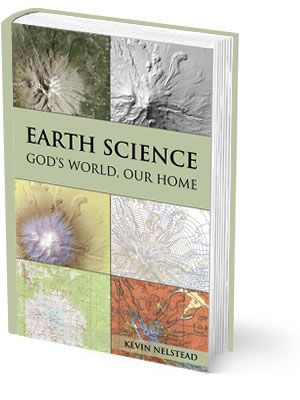

- Earth in Space
- Visualizing Earth
- Thinking About Earth
- Matter and Minerals
- Rocks and the Rock Cycle
- Plate Tectonics and Mountain Building
- Volcanoes and Earthquakes
- Weathering, Erosion, and Soils
- Surface Water and Groundwater
- Landforms
- Unraveling Earth History
- Oceanography
- The Atmosphere
- Weather
- Climate and Air Pollution
The text is 501 pages long, including Afterword, Glossary, Appendix, Biblical Citations, References, Image Credits, and Index.
Each chapter, as listed out above, is further broken down into sections:
The pages, while packed with text, are broken up with beautiful color photographs and illustrations:
Further, after every section (as seen above in the Table of Contents), there are a few questions for students to check their comprehension. While answers are not provided in the book itself, Novare does provide the answers in a supplement available for download on its website. This is what the questions and answers look like:
Along with the answers to these "check yourself" questions, Novare offers additional resources on the website. For each chapter, Novare provides supplements which may be YouTube videos, websites, maps, or something else. In many cases, they provide pages of these. It really helps to round out the curriculum, so if you have concerns that this is *just* a textbook -- banish them! Further, experiments are included in the text, so this *is* a lab science. Weekly cumulative quizzes are available on a separate (not included with purchase of the text, but which I received as a download for this review) Resource CD, but chapter questions at the end of each chapter could be used in lieu of those quizzes if you prefer (N.B., I purchased the Resource CD for Chemistry for Nicholas and consider it a very worthy investment). One thing that makes the Resource CD quizzes nice (apart from the fact that they are a built-in part of the curriculum) is that they tell you how many points each question is worth, making grading a cinch. Another excellent feature of the Resource CD is Weekly Review Guides. Each week, your student is told several tasks he needs to do as review of the week's work. Tasks may include drawing sketches, reciting or listing things aloud, and/or cumulatively reviewing all quizzes thus far. If you're worried about making the Earth Science book into a complete science course, I strongly encourage the purchase of Resource CD!
The Twins and Earth Science
I am sure that we will get to the point where I don't do the twins' "group subjects" as read-alouds, but we are not there yet. I enjoy reading to them, and they enjoy hearing me read. So, for now, that is how we have been handling Earth Science. Each chapter begins with a listing of vocabulary words. The number of words varies quite a bit by chapter. For example, Chapter 1 has 44 words to be defined; Chapter 2 has 25. The book states that a student should be able to define those words in a sentence or a paragraph. Now, my twins are very different. Mary-Catherine love to write her assignments. She's like me. Michael has dysgraphia. He doesn't like to write things down. So, for Michael, he can tell me the meaning of the vocabulary words orally, while Mary-Catherine writes them in her notebook. Homeschooling flexibility for the win! Similarly, the Learning Checks that follow each section can be done either orally or in written form. If you divide your work by doing one section of the text per day (so, for example, 11.1, 11.2, etc. in the picture of the TOC above), those Learning Checks make for a nice daily summary of your science work!
At this point in the curriculum, we are almost to the first lab, and I'm really excited about it, because it is on topographical maps! Because we love to visit the Rocky Mountains (from flatter-than-flat Houston, TX!), my kids have some experience reading topographical maps. What they don't have experience with is constructing a topographical profile! This activity is one that I didn't do for the first time until college geology. I love that my twins will get to do it as rising 7th graders! Looking ahead to future labs, they, too, resemble things that I did in college geology, such as identifying rocks and minerals. The labs do not require much at all in the way of specialized materials. For example, when identifying minerals, you don't need minerals: you identify them based on the characteristics listed for you.
Now for the important part! What do my twins think of Novare's Earth Science? They love it. We have done science (Earth science, even) from many different companies in the past, and one complaint the kids have always had is that the mental gymnastics required to meld geology, plate tectonics, mountain building, and other Earth science topics with a Young Earth mindset renders the curriculum, well, less than credible to them. From my scientist-husband's point-of-view, such curriculum has no place in our homeschool at all. To find Novare, then, is like the answer to a prayer. A company that recognizes a God-created and ordained universe that is 13.77 billion years old is like meeting a kindred spirit. I know that many of my blog readers will disagree, and that's okay. I have always thought that the most important thing is recognizing that God created everything. Novare absolutely does that.
As I mentioned at the outset, Novare has more than just Earth Science! I have been planning for Nicholas to do General Chemistry next year (like I said, I've already purchased it), but after reading a lot on the Novare website, I'm wondering if he should actually be taking Introductory Physics instead. Novare suggests that there is a great advantage to a "Physics first" approach to high school science. I love Novare so much, and I'm so confident in their approach to science, that I will likely just go ahead and buy Introductory Physics and then decide in what order to have Nicholas do the courses.
The great news is that you don't have to have a high schooler to delve into Novare Science & Math! Their Science for Every Teacher was written especially for K-8 teachers and homeschooling parents to explain scientific concepts. Fortunately, the Crew got to review every Novare text I've linked in this review, so by clicking here or on the banner below, you can read reviews of any of the products that interest you the most. I'll definitely be reading all of the reviews on Introductory Physics!





My (Re)Viewpoint: Review Of Novare Science And Math'S Earth Science >>>>> Download Now
ReplyDelete>>>>> Download Full
My (Re)Viewpoint: Review Of Novare Science And Math'S Earth Science >>>>> Download LINK
>>>>> Download Now
My (Re)Viewpoint: Review Of Novare Science And Math'S Earth Science >>>>> Download Full
>>>>> Download LINK